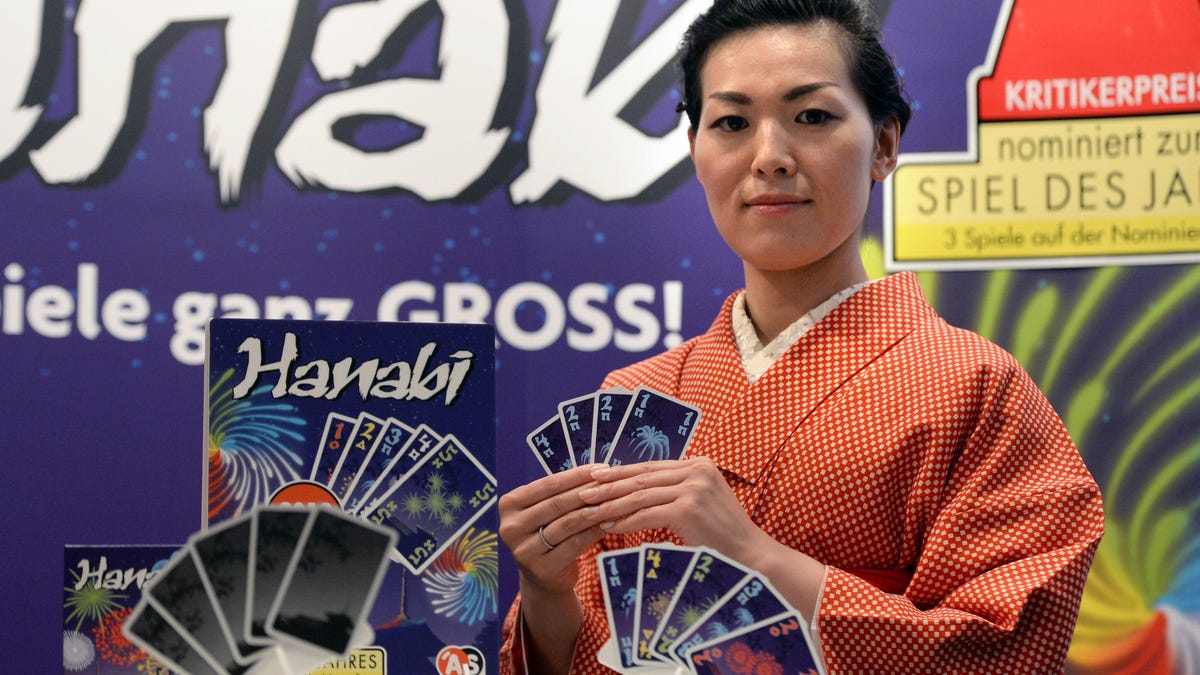Facebook's new card-playing bot shows AI can work with others
The bot got a nearly perfect average score playing the card game Hanabi.

Hanabi is a card game that involves logic and teamwork.
Facebook has already built artificial intelligence-powered bots that can crush pros in popular games such as Texas Hold'Em poker and the board game Go. On Friday, the company's AI researchers said they've conquered another challenge: creating a bot that can achieve high scores in a card game called Hanabi that involves teamwork.
Hanabi, the Japanese word for fireworks, is a complex card game for two to five players with limited rounds of play that requires the participants to collaborate. Each person can see the other players' cards but not his or her own. During a turn, a player can make several moves, including hinting to other players what they hold. Players arrange a set of cards in a specific order and add up the cards with the highest number in each set to receive a score.
In a game against a bot, Facebook's bot modified its strategy throughout game. The bot "searched" for a list of possible hands it might be holding, a list that changed as the other bot revealed information. Since the goal of the game is to work together to achieve the highest possible score, players use logic to infer why certain cards are played. During its turn, Facebook's bot determined the best move to make after simulating hypothetical games. Hanabi has up to 10 million possible hands, Facebook said.
The card-playing bot illustrates how AI can work with other bots or people to reach a goal, similar to the way humans do in their daily lives. Facebook's AI researchers said the findings could be applied to a range of applications, including improving self-driving cars and virtual assistants.
"The reason we're interested in Hanabi is not primarily about games," said Adam Lerer, a research engineer at Facebook AI Research. "It's about figuring out how to build these capabilities into AI systems like self-driving cars or conversational agents that need to actually understand the mental state of other people that they're interacting with through their actions."
A self-driving car, for example, would need to predict how other vehicles intend to move throughout the road as it navigates traffic. Facebook's AI research team is focused on advancing AI overall -- not on a specific product.
At one point, Facebook's bot playing two-player Hanabi had an average score of 24.61, out of a highest possible score of 25. Advanced Hanabi players estimate that humans achieve a perfect score 60% to 70% of the time, the company said. Facebook's bot got a perfect score 75% of the time, the company said.
Outside of Facebook's latest AI milestone, the company acknowledges there's more it wants to achieve to advance AI.
Noam Brown, a research scientist at Facebook AI, said the team wants to focus on helping AI understand what humans are trying to say and express through language. Researchers also want AI to be able able to express its intentions to a human in a similar way.
Real life situations are often more complex than working with someone else or trying to defeat an opponent, Brown said. Negotiations, which aren't purely adversarial or cooperative, are an example of such situations, he said.
"It's somewhere in between," Brown said. "We want to have AI that can cope with those kinds of settings as well."

